
Book Reviews: October 2012
The Way We Sleep, Stories edited by C. James Bye and Jessica Bye
How The Losers Love What’s Lost, Poetry by Patrick Ryan Frank
The Beautiful Wishes of Ugly Men, Short stories by Adam Prince
Boarded Windows, Fiction by Dylan Hicks
What the Zhang Boys Know: A Novel in Stories, Fiction by Clifford Garstang
Hush Hush, Short stories by Steven Barthelme
fff
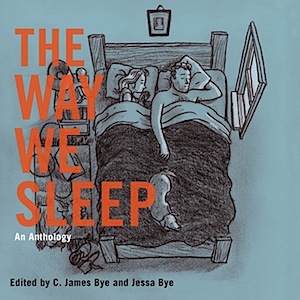 The Way We Sleep
The Way We Sleep
Stories edited by C. James Bye and Jessica Bye
Curbside Splendor, 2012
ISBN-13: 978-1936747313
$15.95; 168pp.
Reviewed by Stephanie Barbé Hammer
At once a hybrid text and a compendium of tales related more or less loosely to the theme of sleep, this generously sized volume edited by C. James Bye and Jessica Bye offers flash-length tidbits and short stories by well-known and less well-known writers, interviews with movie and TV directors, and a healthy dose of comics. Stand out stories are those by Steve Himmer, Dakota Sexton, and Billy Lombardo, while the comics “Erika’s Dream,” and “Bed Man” leap off the page with pleasingly vibrant visual complexity. The comics section closes with the tantalizing and oddly poignant “Asleep.” While the individual stories do not always persuade, the volume displays an exciting interest in postmodern juxtapositions of textualities—which at their most powerful, co-create an intricate web of narratives.
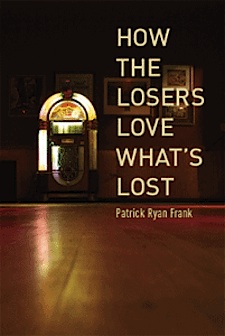 How The Losers Love What’s Lost
How The Losers Love What’s Lost
Poetry by Patrick Ryan Frank
Four Way Books, 2012
ISBN-13: 978-1935536208
$15.95; 80pp.
Reviewed by Raul Alvarez
On the back cover of his debut collection, How The Losers Love What’s Lost, published by Four Way Books (and winner of their prestigious Intro Prize in Poetry), is a picture of author Patrick Ryan Frank standing in front of some trees, wearing a fitted, long-sleeved, button-down white shirt and a black tie. He is fiddling with the knot of the tie with his right hand. This is a helpful image to consider when reading his work.
In the picture, Frank looks like the kind of guy you’d drink a beer with. He does not, however, resemble someone capable of crafting one of the most empathetic, structurally-polished, and fully-realized collections of contemporary poetry in recent memory.
How The Losers Love What’s Lost is the best kind of title. It is alliterative, balanced, and a tool for entering the text. These poems are a body of narratives, and their connective tissue is loss. Frank honors these losses with reverent attentiveness:
Heavy was the paper number pinned
upon my back. Heavy were the eyes
upon me. Heavy were my bones and black
the asphalt, hard and rising swift like water
in a flooding car, like anger in the back
of someone’s throat. It seemed so clear: the motion
underneath it all, the lines laid out,
each step unto the next, into the near
expected. I understood. And then I fell.
And from the world I fell into the world.
From these profoundly intimate opening lines, the reader is encouraged to shut up and listen. From the litany of repetition, to the interpolated rhythm and sometimes subtle rhyme, Frank braces the poem’s music with structural integrity. The losers we discover here are given voices whose timbre, content, and strength redeem their individual losses. And while the stories divulged within this impressive book are what display how the losers love what’s lost, Frank’s mastery of language and his attention to empathy give those losers authority and grace.
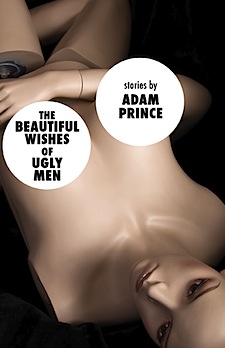 The Beautiful Wishes of Ugly Men
The Beautiful Wishes of Ugly Men
Short stories by Adam Prince
Black Lawrence Press, 2012
ISBN-13: 978-0982876664
$18.00; 214pp.
Reviewed by Renée K. Nicholson
“I think there’s a moral there, but I’m not sure what,” the narrator of “Kink” in Adam Prince’s story collection The Beautiful Wishes of Ugly Men tells us. “Something about how all men deserve punishment just for being what we are. Something about the close relationship between lust and danger, or the wonders of being tied down.” And while not all the characters in Prince’s collection give us such an unvarnished truth, the narrator of “Kink” could be a de facto spokesperson for the whole motley bunch, each of whom yearns for and resists his better self.
Rage and desperation often mix in unexpected ways as the characters in this collection struggle with the lost legacy of privilege and the empty promises of male fantasy, as they also feebly attempt to engage with friends, lovers, and themselves in pursuit of, if not happiness, then a hard fought contentedness. Kid, the hapless meth addict in “Action Figure” who imagines himself as the superhero toy he finds near his apartment, can’t quite visualize a life outside his own elaborate fantasy, even as he watches the pathetic true-life version of himself on his dealer’s security footage.
In “Big Wheels For Adults,” Peter leaves pregnant girlfriend Carli home to cavort with his out of control childhood buddy Jocko. Together, Peter and Jocko binge on cocaine and Peter has a near tryst with a stripper. Peter’s desire for excitement through the rougher edges of human sexuality is tempered by a conscience he doesn’t quite know how to accept.
Masky, the hapless protagonist of “Ugly Around Him,” is unable to come to terms with the sudden death of his daughter, who was struck down by a car. In his grief, Masky looks for friendship in his neighbor Ed Hold, a convicted sex offender, who despite his perversions, tries to be decent. The scenarios of these stories would seem comic, disingenuous, or over the top if they weren’t so plausible. In a world where CNN can report on the decline of the modern male, citing statistics ranging from income, education, and connectedness to family and children and the like, the characters in Prince’s collection may be on the fringes, but certainly not far-fetched.
The men in these stories desire affection, attention, and the chance to be respected. Kid, the meth addict, for all his delusions, understands this most acutely. “The sun is a spotlight shining down on a man unlike other men, a man able to hold his own fate securely in one hand.” But control is the biggest fantasy of all. These characters are pitiable yet engaging, struggling to make sense of a world that has allowed them to damage themselves, their stories an attempt at rescue. And if they aren’t able to live up to the beautiful wishes of better selves, they do strive for a more precarious balance with peace and intimacy. When the narrator of “Kink” includes a card/explanation for a potentially less-than-appropriate gift to his girlfriend, he tells the truth of all these damaged souls. “On the card, I write my most sincere attempt at confession: Dear Kate, I’m not the man you think you’re getting.” Kate, on behalf of herself and the reader, accepts him as he is, perhaps even a bit as he would like to be.
 Boarded Windows
Boarded Windows
Fiction by Dylan Hicks
Coffee House Press, 2012
ISBN-13: 978-566892971
$16.00; 252pp
Reviewed by Art Edwards
As a writer of three rock novels, I took a particular interest in Dylan Hicks’s Boarded Windows. The novel follows a young record store clerk through his various travails, in particular his complicated relationship with a musician/drug dealer father figure named Wade who lives with him for a time in 1991. Windows is Hicks’s debut, and the author’s ability to stretch his language beyond obvious tropes is prominent throughout. His unnamed narrator and protagonist describes his own handsomeness as “more of an electric cuteness.” And on Wade during a night out: “Wade was so facile that night, so at one with everything; he was a raindrop on a sidewalk ginkgo leaf.”
At the same time, this search for le mot juste can lead Hicks astray. He writes, “The walk home was dark and windy, strange and slippery—no, first crepuscular, then dark, I now remember.” It’s hard to say what “crepuscular” adds other than to make the author seem a little too excited about using it. Likewise when the narrator and friend Maryanne play with a voice recorder: “The recorder had a range of playback speeds, so we taped our voices and then pitched them down and up to ursine and rodential frequencies.” I can’t imagine any reader getting more from “to ursine and rodential frequencies” than “by making them slower and faster.” Hicks misses when he tries to make his prose pinpoint accurate—most of us don’t need to be pricked to get the picture.
The narrator focuses much of his attention on Wade, who crashes at the narrator’s and his girlfriend Wanda’s place in Minneapolis before continuing on to Berlin. Wade is a kind of late 20th century self-made aesthete whose take on music and life are the liveliest parts of Windows. Early in the novel, after warning the narrator not to get “sucked in,” Wade elaborates:
“Money, status, homeownership, credentials, all that. Embourgeoisement looms.”
“I wouldn’t be able to buy a house on an assistant manager’s salary,” I said.
“Sure you would, eventually. Or it’ll lead to something else. You’ll become the manager, then—what?—district manager, area manager—”
“Regional manager, they call it.”
“Regional manager. Next it’s…that’s probably as far as you could go.”
Wade takes his life’s disappointments out in subtle and not-so-subtle ways on the narrator—for example, by sleeping with Wanda—largely because the narrator has something Wade will never know again: youthful possibility.
While living with the pair, Wade offers up ideas and stories the way a popular college professor might at a campus party. He claims to have mingled with famous musicians like Jaco Pastorius and Charlie Mingus, but is evasive when the narrator presses him on them. Wade’s spiel is always provocative, something he seems to offer in lieu of rent.
And that’s where Windows fails me. During his stay with the narrator, Wade takes from him in just about every way, but the narrator barely reacts. Everything happens to the narrator, but he causes nothing to happen. About two thirds in, when Wanda tries surreptitiously to give $1500 to Maryanne, it feels like the first time any character apart from Wade tries to better her condition. All this makes the narrator, our protagonist, hard to root for, which dooms any story.
Characters who love music are tricky to write about. This is because listening to music is largely a passive pursuit, and passive pursuits don’t lend themselves to conflict. Hicks creates a memorable secondary character in Windows, but his main one could’ve used more attention.
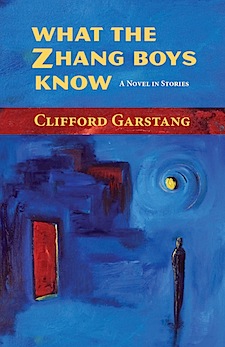 What the Zhang Boys Know: A Novel in Stories
What the Zhang Boys Know: A Novel in Stories
Fiction by Clifford Garstang
Press 53, 2012
ISBN-13: 978-1935708612
$17.95; 201pp.
Reviewed by Ed Bennett
Clifford Garstang’s novel, What the Zhang Boys Know, is set in present-day Washington, D.C., in a neighborhood on the verge of gentrification. The Zhang brothers, Simon and Wesley, live in a condo with their father, a recent widower, who is scrambling to find adequate childcare for his boys. They spend much of their time exploring their building, the Nanking Mansion, watching the comings and goings of their neighbors.
As the subtitle implies, the book is structured like a collection of short stories, each able to stand independently. The attraction of this book is the way Garstang’s characters interact with each other from one story to the next, building the novel’s arc while providing chapter-by-chapter tension. Each neighbor, like the Zhang boys, searches for his or her own place in a maelstrom of lost love, cultural conflict and a battered economy. The Zhang boys search for their deceased mother, hoping that the resurrection story they were taught in Sunday school might apply to her as well.
The Nanking Mansion sits in the shadow of “official” Washington, D.C., but is as far from this city as from its namesake in China. It echoes the cultural conflict experienced by the Zhang boy’s father, Feng-qi, a Chinese immigrant respectful of the customs of his childhood, yet striving for the American dream of home ownership and acceptance.
Ultimately, What the Zhang Boys Know is a book about the many types of love we can experience. Simon and Wesley learn their love for their mother is not lost, although they must continue to seek it. Their neighbors illustrate more superficial forms of desire—for things and fleeting relationships, which change constantly. Garstang empathizes with all of them, refusing to take sides among the people who are trying to find a little Eden amid the rubble of urban development.
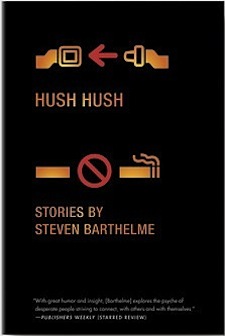 Hush Hush
Hush Hush
Short stories by Steven Barthelme
Melville House, 2012
ISBN-13: 978-1612191591
$16.95; 208pp.
Reviewed by Joe Ponepinto
There is a pragmatic eloquence to Steven Barthelme’s writing, in the way his characters explain their decisions and their failures to live up to their potential. It’s a sort of I’ve-finally-got-this-mess-figured-out-but-it’s-too-late-for-me-to-change philosophy, and it’s often beautiful and profound, yet not forced upon readers. Quinn and Bailey and Webster and assorted unnamed narrators know they don’t have to impose their way of thinking on anyone, because if others experience what they’ve endured, they’ll probably come to the same conclusions. As Webster says in the story, “Vexed”:
“Teresa thinks she just might possibly love me, and that’s what makes you love a woman, that possibility. If she’s sure she loves you, if it’s a certainty, you get overconfident, even indifferent, but if it’s only a possibility, you are finished. Maybe it’s different for other people, I don’t know.”
He implies he only knows how things work for him, but we at least can commiserate. Who hasn’t been in that predicament?
Barthelme, brother of fiction notables Donald and Frederick, writes of a world that is Texan, educated, and blue collar, filled with second guesses, self-doubts, and cats (well, nobody’s perfect). His men (yes, they’re all men, but these are not “guy” stories) haven’t quite given up trying, but they’ve recognized the arbitrary nature of the culture that surrounds them, and know it’s just not worth fighting too hard.
In “Interview,” Terry Quinn, a recurring character, considers his abandoned career as a tax attorney and his new, out-of-necessity position as an auto mechanic. We get the impression that despite his schooling and career, the upwardly mobile life was never for him:
“He liked the law still, really, the arrogance of its made-upness, the handsome job men had done with it. It wasn’t law that had set him down on the cool concrete with the grime on his fingers, and grit in his eye, and idiot grin on his face. The law was all right. And the money was all right. And the clock with the big numbers, he thought. I loved that clock.”
Life in these stories hands out lessons like the blackjack dealer in the Pushcart winning “Claire,” an alluring but indifferent young woman, who may be helping even the odds, but then, maybe not. They come fast and you need to know how to take them, and when to stop playing.
Even Jesus and God turn out to be just a couple of regular guys. In “Heaven,” the afterlife “resembles a very large Days Inn,” and God and his Son crack up over the fact that people took the idea of Hell seriously. Better yet, scotch in heaven is tasty but harmless, and the narrator’s back doesn’t hurt anymore. In fact, his body has become quite buff since he got there.
Among the best of the lot is the title story, “Hush Hush,” which deals with the usually taboo subject of incest in an open and unique light. Again, the protagonist—Tilden in this case—rationalizes his decisions, like a twenty-first century Humbert Humbert, to the point where he is unafraid even to admit what he is doing to a friend. And it’s that rationalization—present in almost every story in this collection—that makes Hush Hush work.
